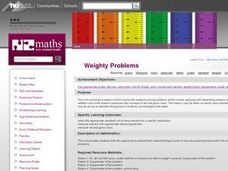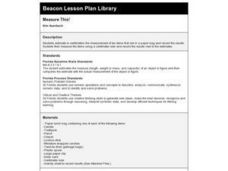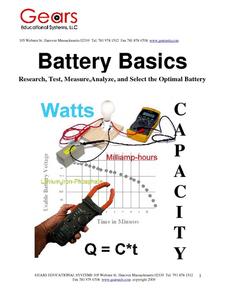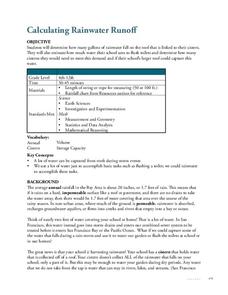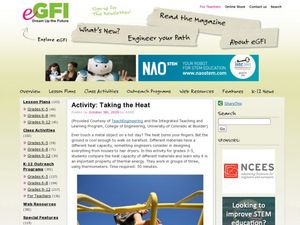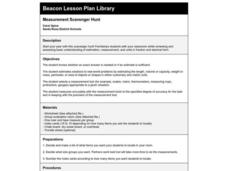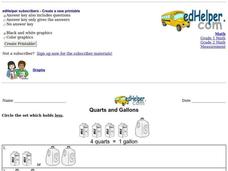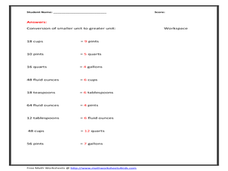Curated OER
Metric Measurements of Capacity Riddle
In this metric measurements of capacity riddle worksheet, students write the unit, either milliliter or liter, for 24 common objects, then use the clues to answer the riddle.
Curated OER
Measuring Lung Volume and Capacity
In this measuring lung volume and capacity worksheet, students perform several experiments testing for exhaled carbon dioxide, measuring lung volume, and measuring lung capacity.
Curated OER
Estimating And Measuring Weight: Grams And Kilograms
In this measuring worksheet, students will estimate the weight of 10 objects and record information in grams and kilograms. Then students will weigh the objects and record the actual weight to complete a table.
Curated OER
Ordering Metric Measurements
In this math worksheet, learners examine a row of measurements in the metric system. Students put the measurements in order from the smallest to the largest. Included are weight, length and capacity; there is no U.S. standard measurement...
Curated OER
Measure Me!
Third graders use nonstandard concrete methods to estimate and record measurements of their body.
Curated OER
How Big is a Breath?
Students demonstrate how to use math skills to measure their lung capacity. In this human biology lesson, students use a clear plastic container, measuring cup and rubber balloons to demonstrate how the lungs work. Students estimate the...
Curated OER
Metric Meals
Sixth graders investigate metric measurements. In this metric measurement lesson, 6th graders explore mass, capacity, and length. Students examine graduated cylinders and balance scales to obtain measurements. Resources are provided.
Curated OER
The Measurement Man
Students explore the measurements of capacity by constructing a creative project in the shape of a man. The man has body parts that represent different units of measurement and can be used to make conversions. This is highly concrete and...
Curated OER
Catch your Breath
Young scholars measure lung capacity and explore factors that affect the amount of air the lungs can hold.
Curated OER
Mass: Applying and Interpreting
Students rotate through six studying stations solving problems that involve applying and interpreting aspects of mass. They solve various word problems, and measure the contents of cans and calculate the mass of two cans.
Curated OER
Length Lotto-Teacher's Notes
Students convert metric units of length, specifically meters, centimeters, and millimeters. In this lesson of converting measurements, students participate in various games which require them to put the measurements in order or convert...
Curated OER
Fun With Adhesives
Students observe, measure, and record the properties in making objects stick together using science tools. In this science lesson, students explore with their senses while mixing flour and water. Additionally, students share their...
Curated OER
Pan Balance: Shapes
Students explore the concept of equivalence as it relates to comparing concrete objects to determine greater or lesser attributes such as length and weight. In this pan balance-shapes lesson, students make estimations while verifying...
Curated OER
Measuring Mania
Second graders turn into measuring maniacs with this activity! With real world objects, 2nd graders practice measuring accurately to the nearest inch and centimeter. After a lecture/demo, students practice with a worksheet imbedded in...
Curated OER
Measure This!
Students estimate the measurement in centimeters for common classroom objects. They check their estimations, discuss the differences and write a paragraph summarizing the activity.
Teach Engineering
Biomes and Population Dynamics - Balance Within Natural Systems
How large can a population become? The fifth installment of a nine-part unit teaches young ecologists about limiting factors that determine the carrying capacity of species in the Sonoran Desert. Here is a PowerPoint to help present this...
LABScI
Circulation and Respiration: Vital Signs
What do your vital signs tell your doctor? An engaging hands-on lesson has your learners monitor their own lung capacity, blood pressure, and heart rate. They then connect the vital measures to the workings of the circulatory and...
Houghton Mifflin Harcourt
Unit 3 Math Vocabulary Cards (Grade 5)
Fifty-four flashcards make up a set to help reinforce math vocabulary. The set offers two types of cards; a word card printed in bold font, and a definition card equipped with an example and labels. Terms include capacity,...
Gears Educational System
Battery Basics
In a series of activities, high schoolers research and compare batteries of different chemistries (such as nickel-cadmium), measure current and voltage, and use multimeters and math to compute their capacities. In the end, they try to...
Techbridge Curriculum
Calculating Rainwater Runoff
Thirsty plants soak up every bit of a rainfall, but what happens to the rain that hits the roof? Calculate the amount of rainwater from your school's roof with an Earth science activity, which brings measurement skills, observation...
Curated OER
Taking the Heat
Students measure the heat absorbed by different materials and learn why engineers need to know how different materials story thermal energy when designing buildings. In this heat capacity lesson plan, students use a thermometer to...
Curated OER
Measurement Scavenger Hunt
Students review estimation, measurement, fractions, decimals while familiarizing themselves with a new classroom at the beginning of the year.
Curated OER
Quarts and Gallons
In this measurements worksheet, students compare the measurement illustrations of quarts and gallons in the 7 problems. Students circle the set that holds less.
Curated OER
Capacity Conversions
For this conversions worksheet, learners convert smaller metric units to larger units, using the work space provided. Answers are included on page 2.









